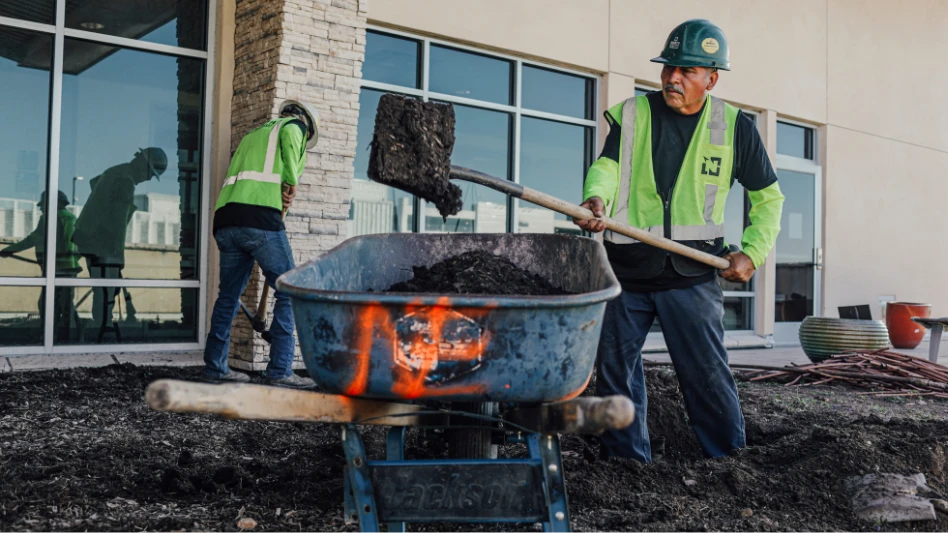Contractors who derive a portion of their business from newly built homes might find themselves with fewer jobs as talk of a failing housing market abounds. But as one Lawn & Landscape online message board participant recently shared, there are ways to use the situation as an upsell opportunity.
Benjamin Elliott, president of Oak Hill Landscape Group in Kennesaw, Ga., had customers who could attest to the shaky state of the housing market. He works with custom home builders who have been struggling with new home sales. So Elliott offered to install landscape lighting at one of the sites and the builder doesn’t have to pay for the job until the house sells.
“It was a basic system: a few uplights and wash lights and it took one guy to install it in 3½ hours,” Elliott posts on the message board. The customer still had to pay for the other services Elliott performed on the lot, including grading, plants, sod and irrigation.
“It was really easy because we were already there working on the rest of the install, so it saved us a few hours in installation because everything was already exposed for us to lay the wire and take it through sleeves, etc.,” he posts.
While he knows it might take a year or two to sell the house, Elliott thinks the deal will pay off.
“I felt it would make our install look great, separate it from other new homes and be a nice bonus for us whenever it gets sold,” he says. “We did charge a little bit more than we regularly would, so it would be worth sitting on it for a while if we had to.”
Not only does the lighting installation make the company’s landscaping install look better, but if all goes well, the deal will lead to more business with the builder.
“The more houses they sell, the more houses will be built for us to install,” Elliott says.
NIGHT BUYS. Some message board participants wonder if anyone will even see the work that is intended to accent the home’s key features and make it attractive to potential buyers.
“Ever go shopping for a house at night? Well, neither has anyone else,” posts Andrew Garulay, owner of Yarmouthport Design Group in Yarmouthport, Mass.
Elliott disagrees. “Many people shop at night and people are encouraged to,” he says, adding he has seen realtor brochures that recommend it. “Why? Because people want to see what is happening on their future street like parties, lots of traffic and the way the house looks at night.”
“I don’t believe that many people are concerned about how a house looks at night, as they usually look the same in the day,” Aksar says. “But, with a well-executed lighting design, that property will look entirely different. Although, if no one knows it’s lit, they won’t know to look.”
For those who might see the house at night, the quality of the lighting display, like the landscaping, can make the difference when it comes to the curb appeal, Aksar adds. Keep in mind factors including the facade of the house, the shape of the roof, the presence of trees and the use of shadows, he says.
“Sure, you can plop a few path lights in here and there, and you can add a tree or two, but really, that’s not going to achieve much of a “wow” from anyone,” he posts.
The equipment needed to create that type of “wow” can be costly and not worth the investment, he adds.
UPS AND DOWNS. Whether or not the lighting will sell the house is not the point, says Todd McCabe, president of McCabe Landscape Group in Wrightsville Beach, N.C.
“He isn’t the one selling the houses,” McCabe says. “Benjamin was just sharing a way to increase revenue and make some quick, easy money, even though he knows he may have to wait a while for it.”
Looking at it from this view and not from the home seller’s view, message board posters then offered their opinions on the effectiveness of Elliott’s upsell idea.
The thought of not charging a fee until the house is sold was too risky of a proposition for Steve Wise of Scapes in Jamestown, Ohio.
“I guess it may help you, but do you really want to wait on your money?” Wise posts to the message board. “If they only custom-build houses, that’s not very many in a season.”
Wise is wary of doing business with builders, he says, explaining that some of them try to pay the landscape contractor less than what the job is worth. And with the housing market in the state it is, the deal could become even more of a risk, Garulay adds.
“They are going to have lots of people waiting for cash when one of those houses sell if they have gotten behind,” Garulay says. “A lot of those people are critical to their being able to continue to work, making them much more important to pay than the guy who put the outdoor lighting on the house that was not going to have any in the first place.”
There is a subdivision being built in Wise’s area and he says he will consider selling them his services only when the homes are finished. He will then try to sell decks, fencing, landscaping and other work and request to be paid up front for the services.
“All I am saying is think about what you are doing before you go selling too many lighting jobs,” Wise posts. “There are better ways to market.”
Elliott says the company doesn’t complete many homes per year and adds he would not have made the deal with the builders if he didn’t have such a solid relationship with the company.
“They pay within 10 days of everything, they give us a good budget to work on, and have been responsible for giving us a lot of work through a contract they gave us that has led us to work with a commercial construction firm on some big projects,” Elliott says. “Plus, we are holding less than $1,200 worth of material.”
The cost of labor for the lighting install was $40, not including the work Elliott did, with about $850 worth of materials used.
“It’s not like I gave them a fireplace in the backyard with a patio and have $10,000 sitting unpaid,” he says.
The investment could pay off before the house is sold. The builders allowed Elliott to place his company’s sign in the yard and he already has received a lead from a homeowner in that neighborhood who’s interested in a lighting install.
“These are $700,000 houses and they have $700,000 neighbors,” Elliott posts to the message board. LL
Get curated news on YOUR industry.
Enter your email to receive our newsletters.
Explore the May 2008 Issue
Check out more from this issue and find your next story to read.
Latest from Lawn & Landscape
- Ever-changing landscape of SEO
- Fleetio acquires Auto Integrate, raises $450M in Series D funding
- Davey Tree expands in St. Paul, promotes Ostlie to district manager
- Schill Grounds Management taps 3 for senior leadership roles
- HD Hyundai Construction Equipment North America adds to wheeled excavator lineup
- High maintenance
- From Design to Proposal: Estimating and Rendering Support Services
- PERC adds Joel Stutheit as senior manager of business development






